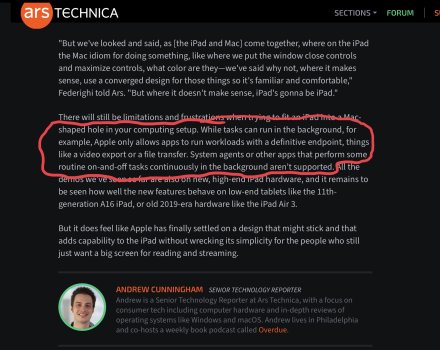It's not a matter of iPad outperforming the MacBook air (although I have no doubt than a M4 iPad pro running MacOS would easily outperform a M1 Macbook air even on sustained load), it's a matter of running the OS fine.I was including laptops with the desktop OSes. They still have different constraints than iPads. People focus solely on the fact that they share a chip, but there are other factors. One being on how the chip is used at different clock speeds at different times and for different durations. This is connected to the fact that they are still different form factors with different focuses. Copy pasting something I wrote before:
They are both fanless but the 13” iPad Pro has around 40% smaller volume to work with than the 13” MacBook Air base, but also you have to factor in that the iPad’s display blocks heat from escaping one entire side of the device, and generates more heat instead. So the thermal capacity of the 13” iPad Pro is likely significantly smaller than the 13” MacBook’s. And the battery also has 30% smaller capacity. (The 11” iPP would have even more disparity in thermal and battery capacity.) These are significant differences in hardware I think people aren’t taking into account.
If you put an exact equivalent OS of the MacBook in the iPad, there will be major drawbacks, particularly in bulkiness and/or battery life. And this will be even more pronounced because the iPad is meant to be unplugged even more than a MacBook is.
Also you mention the larger iPad specifically, but that’s not a separate product line. Whatever works for the larger one (if it would even work for that) would also need to work for the smaller one.
The other constraint is ease of use for the everyday person. Apple wanted to get away from the complexity of macOS with iPadOS. They’re adding things back carefully, but if they add back literally everything then they would lose the simpler appeal of iPadOS.
The only way to create an equivalent OS in tablet form is to make a separate Mac tablet that would be significantly thicker and heavier than iPads.
The new Surface pro 12" weighs as much as a M1/M2 iPad pro, it's thin, it's fanless, has similar battery life to an iPad and runs Windows. It's around M2 performance. The M4 iPad pro while thinner has better passive cooling than the M1/M2 and is more efficient. Would run MacOS great for a ton of people. Would probably run Windows better than the new Surface pro. Not that it should run MacOS or Windows. But these differences are overemphasized and often exaggerated to make the point that iPad pro should not run MacOS. Well, it shouldn't, but not because it can't. It can, in its current form, and many people would be more than happy with its performance. That MacOS is not the right OS for a tablet is a totally different thing.


